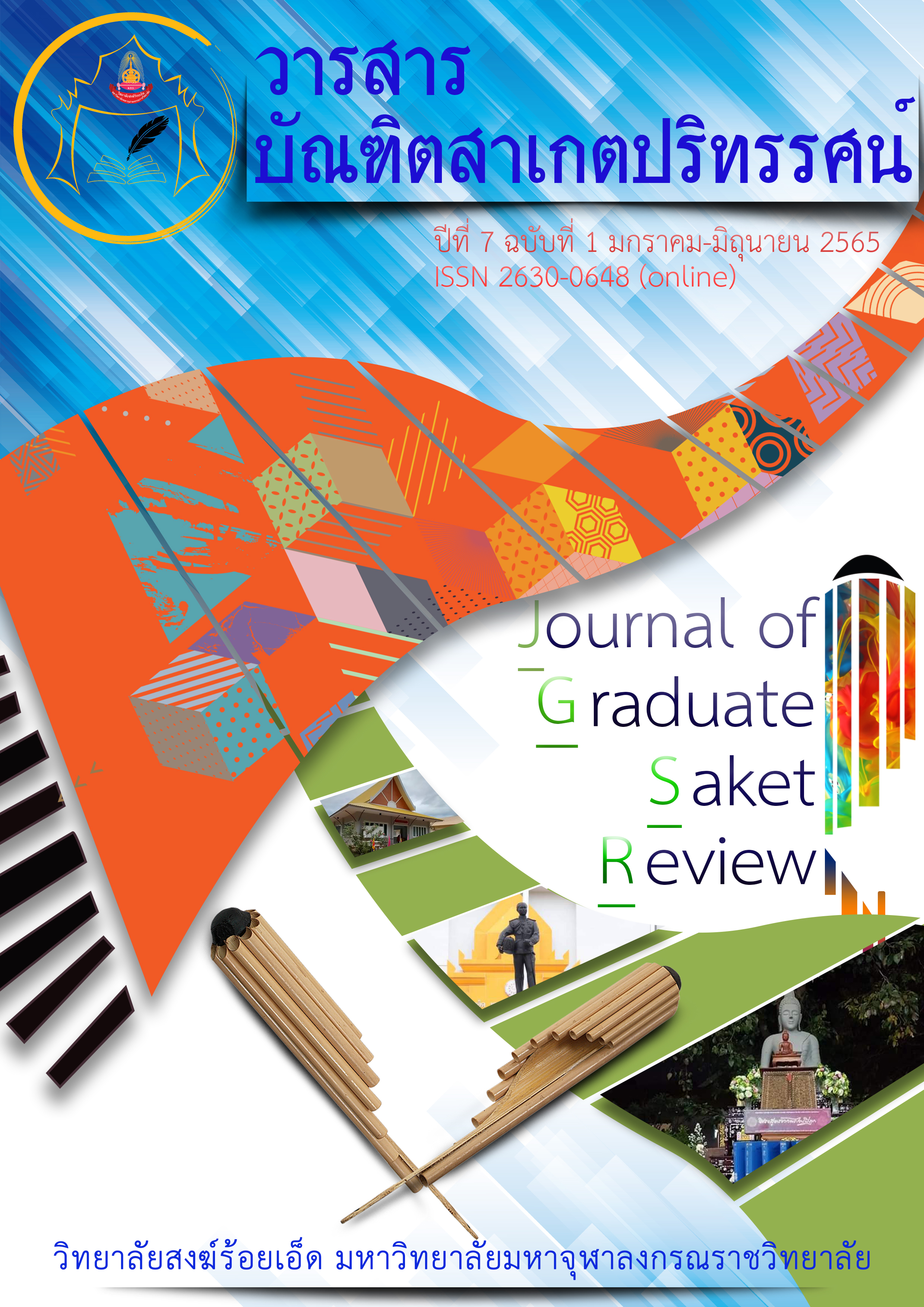Promoting Buddhist Holistic Health in School for the Elderly, Roi Et Province
Main Article Content
Abstract
This research is a mixed method research by using the form of two research methods, namely quantitative research that was used to distribute a questionnaire for the elderly who attended school for the elderly in Roi Et Province and qualitative research that was used in-depth interviews and focus group discussions with local leaders, geriatric school administrators, village health volunteers and government representatives from schools for the elderly people in Roi Et Province.
The Promotion of Buddhist holistic well-being in schools for the elderly, Roi Et Province found that : physical well-being is the development of the body to be able to relate to the physical environment in a way that is beneficial, harmless, and knows how to consume the four factors to the highest value, do not consume according to the values which may have a negative effect on health, psychological well-being, it promotes Buddhist holistic well-being in school for the elderly, Roi Et Province, has gained knowledge, practiced meditation, praying in the morning-evening and before going to bed, intellectual well-being is a training for the elderly to stay in negligenceม not obsessed knowing, feeling at ease, being self-conscious, not thinking too much, having knowledge and understanding of oneself, social well being, it is able to co-exist with others such as family members, friends, colleagues and neighbors.
The innovation for promoting Buddhist holistic well-being found that : physical well-being, it was carried out various activities, namely worshiping-praying, meditating, being in harmony with the environment, activities age appropriate, self-sufficient living, psychological well-being, there is activity of mind volunteering to develop the environment, training the mind to have patience, living a Buddhist way of life aims to strengthen mental health, mental development to have a good mood, having a happy mind, intellectual well-being, there is the value learning activities and happy living in harmony with the environment, there is using Buddhist principles in solving life problems, social well being, there are activities to build good relationships with family, community and society.
Article Details

This work is licensed under a Creative Commons Attribution-NonCommercial-NoDerivatives 4.0 International License.
เนื้อหาและข้อมูลในบทความที่ลงตีพิมพ์ในวารสารบัณฑิตสาเกตปริทรรศน์ ถือเป็นข้อคิดเห็นและความรับผิดชอบของผู้เขียนบทความโดยตรงซึ่งกองบรรณาธิการวารสาร ไม่จำเป็นต้องเห็นด้วย หรือร่วมรับผิดชอบใด ๆบทความ ข้อมูล เนื้อหา รูปภาพ ฯลฯ ที่ได้รับการตีพิมพ์ในวารสารบัณฑิตสาเกตปริทรรศน์ ถือเป็นลิขสิทธิ์ของวารสารบัณฑิตสาเกตปริทรรศน์ หากบุคคลหรือหน่วยงานใดต้องการนำทั้งหมดหรือส่วนหนึ่งส่วนใดไปเผยแพร่ต่อหรือเพื่อกระทำการใด ๆ จะต้องได้รับอนุญาตเป็นลายลักอักษรจากวารสารบัณฑิตสาเกตปริทรรศน์ ก่อนเท่านั้น
References
กรมกิจการผู้สูงอายุ กระทรวงการพัฒนาสังคมและความมั่นคงของมนุษย์. (19 ธันวาคม 2561). สืบค้นเมื่อ 30 ธันวาคม 2564, จาก http://www.dop.go.th/th.
ถวิล ธาราโรจน์ และคณะ. (2541). จิตวิทยาทั่วไป. (พิมพ์ครั้งที่ 2). กรุงเทพมหานคร: โรงพิมพ์ทิพยฺวิสุทธิ์.
พระครูโสภณพุทธิศาสตร์และคณะ. (2562). โรงเรียนผู้สูงอายุ : การจัดการสุขภาวะ และสวัสดิการผู้สูงอายุในภาคตะวันออกเฉียงเหนือ. วารสารมหาจุฬานาครทรรศน์. 6(2), เมษายน.
พระมหาสุทิตย์ อาภากโร ดร. (อบอุ่น). (2558). การเสริมสร้างสุขภาวะและการเรียนรู้ของสังคมตามแนว พระพุทธศาสนา. รายงานการวิจัย สำนักสนับสนุนสุขภาวะองค์กร สำนักงานกองทุนสนับสนุนการสร้างเสริมสุขภาพ(สสส.).
เพ็ญพิไล ฤทธาคณานนท์. (2550). พัฒนาการมนุษย์ (Human Development). (พิมพ์ครั้งที่ 2). กรุงเทพมหานคร: ศูนย์หนังสือแห่งจุฬาลงกรณ์มหาวิทยาลัย.
มหาวิทยาลัยมหาจุฬาลงกรณราชวิทยาลัย. (2539). พระไตรปิฎกภาษาไทย ฉบับมหาจุฬาลงกรณราชวิทยาลัย. กรุงเทพมหานคร: โรงพิมพ์มหาจุฬาลงกรณราชวิทยาลัย.
แม่ชีสุภาพ รักษ์ประสูติ. (2560). การศึกษาแนวทางการสร้างความสุขของผู้สูงอายุตามวิถีพุทธ. วารสาร มจร การพัฒนาสังคม. 2(1), 74-85.
ยุวดี รอดจากภัย และคณะ. (2557). รูปแบบการพัฒนาชุมชนและครอบครัว ต้นแบบเพื่อดูแลผู้สูงอายุ
แบบบูรณาการ. รายงานวิจัย. (สำนักงานคณะกรรมการวิจัยแห่งชาติ).
สุพรต บุญอ่อน และคณะ (2560). โรงเรียนผู้สูงอายุ : การจัดการสุขภาวะและสวัสดิการผู้สูงอายุในภาคกลาง. รายงานวิจัย. มหาวิทยาลัยมหาจุฬาลงกรณราชวิทยาลัย วิทยาเขตนครสวรรค์.


